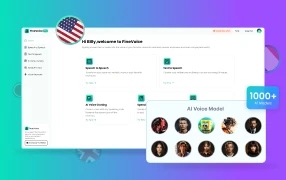
Too complicated? Don’t worry. You can try other simple TTS services. Our FineVoice is a cost-effective and user-friendly option. It offers high-quality voice synthesis, extensive language support, and intuitive voice features, making it a great choice for various applications, from content creation to customer service automation.
In an era where artificial intelligence is transforming industries, Microsoft Azure Text to Speech is a powerful tool for converting written text into lifelike speech. With its advanced neural network technology, extensive language support, and customizable options, it offers unparalleled voice synthesis capabilities.
Whether you’re enhancing customer interactions, creating engaging content, or developing accessible educational materials, Azure Text to Speech can elevate your projects.
In this review, we dive into its features, pricing, pros, and cons, and provide practical insights to help you determine if it’s the right fit for your needs.
Overview of Microsoft Azure Text to Speech
Do you know what Microsoft Azure Text to Speech is for? Read this section to learn what Azure can do for you. Find if it can meet your project needs.
What is Microsoft Azure Text to Speech?
Microsoft Azure Text to Speech is an AI API service that converts text into lifelike speech. It enables developers to create natural-sounding voices for applications, from text readers to chatbots. With customizable voices and fine-grained audio controls, it’s a versatile tool for brand differentiation.
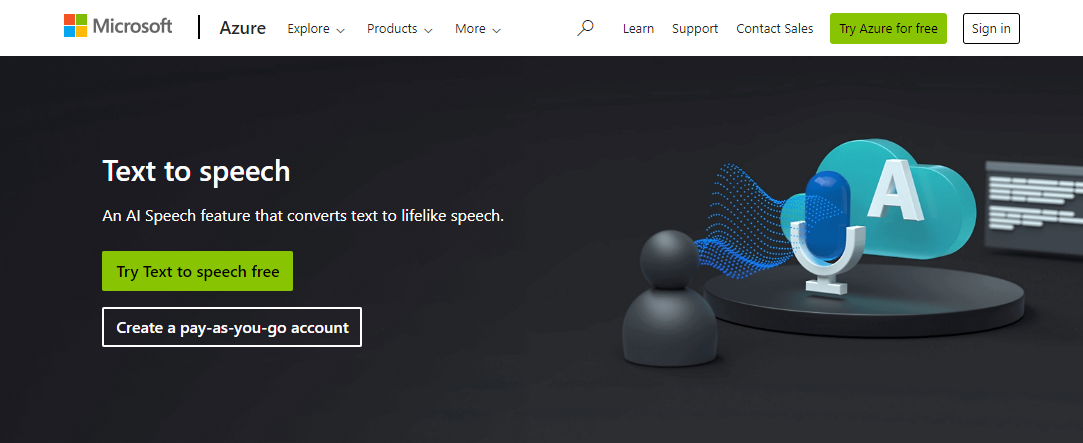
Azure AI Text to Speech’s Key Features
Lifelike Synthesized Speech
Imagine your application speaking with the warmth and nuance of a human. Azure Text to Speech delivers fluid intonation and emotion, making interactions more engaging.
Customizable Text-Talker Voices
Want your brand to stand out? Customize AI voices to reflect your unique identity. From playful to professional, tailor voices to match your audience and purpose.
Fine-Grained Audio Controls
Adjust the rate, pitch, pronunciation, and more. Fine-tune the voice output to suit specific scenarios, ensuring an impeccable user experience.
Flexible Deployment Options
Whether in the cloud, on-premises, or at the edge using containers, Azure Text to Speech adapts to your infrastructure needs.
Custom Neural Voice
Go beyond standard voices. Create bespoke, highly realistic voices that resonate with your users, reinforcing your brand’s personality.
?? Pros:
- Covers 140+ languages and dialects and offers over 500 standard AI voices.
- Offers extensive customization options for voice output through SSML.
- Benefits from Azure’s robust cloud infrastructure, ensuring scalability and reliability.
- Seamlessly integrates with other Microsoft Azure services and third-party tools.
?? Cons:
- Can be expensive for high-volume usage compared to some alternatives.
- Requires a learning curve to utilize advanced features and integrations fully.
- Relies on an internet connection for cloud-based functionalities.
- Sometimes inaccurate with pronunciation and word recognition.
How Much is Microsoft Azure Text to Speech?
Here’s a summarized table for Microsoft Azure Text to Speech’s free tier, pay-as-you-go, and commitment tier pricing:
| Pricing | Free Tier | Pay-As-You-Go | Commitment Tiers (monthly) |
| Neural Voices | 0.5 million characters/month | – | $960 for 80M characters $3,900 for 400M characters $15,000 for 2,000M characters |
| Standard Voices | N/A | $15 per 1 million characters | N/A |
| Custom Neural Voices | N/A | Professional Voice Synthesis: $24 per 1M characters |
N/A |
| Custom Voice Training | N/A | $52 per compute hour Up to $4,992 per training |
N/A |
| Endpoint Hosting | N/A | $4.04 per model per hour | N/A |
Speech synthesis usage is billed per character. Avatar is billed per second. Training and model hosting is billed per second.
Neural voices only support real-time synthesis, this does not include long audio creation.
For more details and pricing about commitment tier connected/disconnected containers pricing tier, visit the Azure Pricing Page.
Best Use Cases for Microsoft Azure Text to Speech
Microsoft Azure Text to Speech is ideal for developers and businesses aiming to enhance applications with natural-sounding voice interactions. It’s particularly beneficial for large enterprises requiring scalable, high-quality voice synthesis, such as customer service automation.
Content creators needing multilingual voiceovers and educational institutions aiming to create accessible content will also find it valuable. Its robust customization options and SSML support make it perfect for those needing fine control over speech output.
However, it may not be the best fit for small businesses or individual users on a tight budget due to potentially high costs for extensive use. Additionally, users without technical expertise might find the setup and integration process complex.
Next, we’ll explore real user reviews from popular review sites and some competitive alternatives to Microsoft Azure Text to Speech.
User Reviews for Microsoft Azure Text to Speech
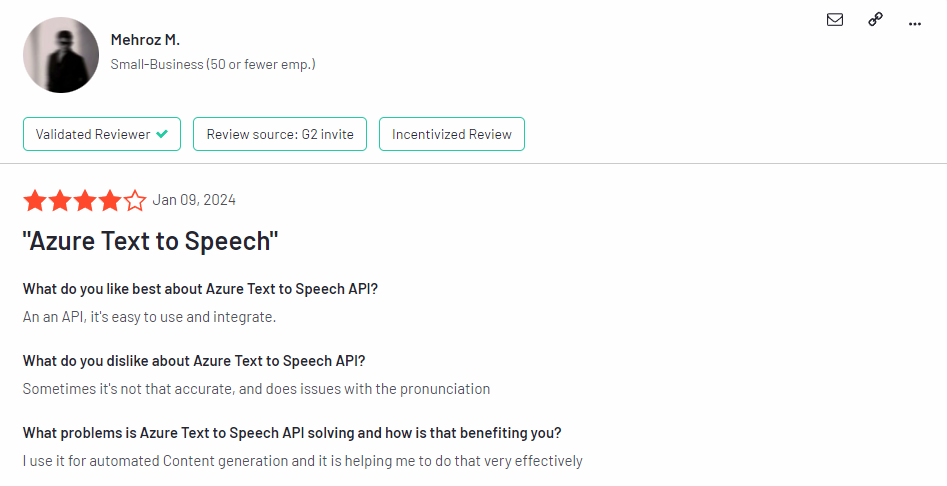
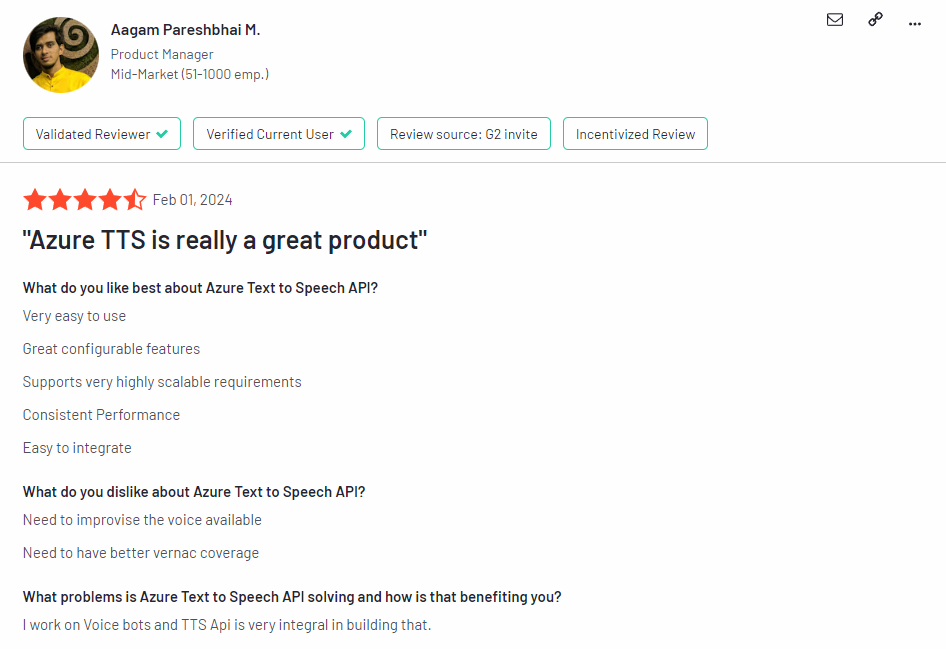
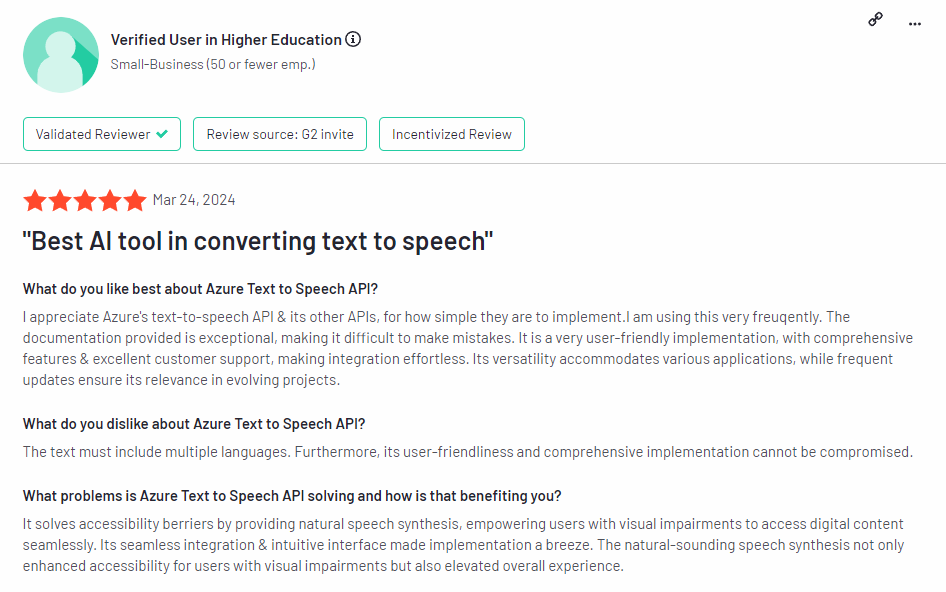
Frequently Asked Questions about Microsoft Azure Text to Speech
Azure Text to Speech ensures data security and compliance with industry standards, making it suitable for applications handling sensitive information.
Yes, Azure offers a free tier with limited usage. For extensive usage, you may need to explore the paid plans based on your needs.
To start, create an Azure account, set up a Cognitive Services resource, obtain API keys, and install the necessary software. Check Azure Speech service documentation and learn courses for a detailed guide.
Azure Text to Speech offers extensive customization, including adjusting pitch, speed, and pronunciation. You can use Speech Synthesis Markup Language (SSML) for advanced control over speech output.
Azure Text to Speech supports a wide range of languages and dialects. The service regularly updates its voice options to include more natural and expressive voices.
Best Alternatives to Microsoft Azure Text to Speech
Check out this table for a comparison of the top alternatives to Azure Text to Speech in 2024. You can click on the links to read comprehensive reviews of the products.
| TTS Service | Voices | Languages & Accents | Additional Features | Pricing |
| Azure Text to Speech API | 500+ | 140+ | Voice Cloning | Free and subscription available for Neural Voices Pay-as-you-go plans based on different features |
| Google Text-to-Speech | 380 | 50+ | Voice Cloning | Free tier based on different voice models Paid plans start at $4 per million characters |
| Amazon Polly | 60+ | 39+ | Voice Cloning | Free tier available (first 12 months) Paid plans start at $4 per million characters |
| FineVoice | 1000+ | 149+ | Voice Cloning Voice Design |
Free version available Paid plans start at 5.99/month |
Conclusion
In this Microsoft Azure Text to Speech review, we’ve explored its features, pricing, pros, and cons. We recommend it for businesses and developers needing powerful, customizable voice synthesis. For small businesses or individuals, FineVoice is a simpler, budget-friendly alternative.
What do you think? Share your thoughts and experiences about Azure and the TTS tools you’re using in the comments below!

![5 Best AI Voice Generators in 2024 [Free & Paid]](https://www.fineshare.com/wp-content/uploads/2024/07/best-ai-voice-generator-feature-image.webp)


Sylvia
Last Updated: July 16, 2024